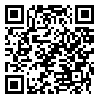Volume 8, Issue 3 (12-2020)
jmsthums 2020, 8(3): 87-95 |
Back to browse issues page
Download citation:
BibTeX | RIS | EndNote | Medlars | ProCite | Reference Manager | RefWorks
Send citation to:



BibTeX | RIS | EndNote | Medlars | ProCite | Reference Manager | RefWorks
Send citation to:
H H K, H M M, M Z, A A. Investigation of factors affecting adolescent sex education in Torbat Heydariyeh (2019-2020). jmsthums 2020; 8 (3) :87-95
URL: http://jms.thums.ac.ir/article-1-808-en.html
URL: http://jms.thums.ac.ir/article-1-808-en.html
1- Department of Educational Sciences, Islamic Azad University, Torbat Heydariyeh Branch, Torbat Heydariyeh, Iran
2- Department of Educational Sciences, Islamic Azad University, Bardaskan Branch, Bardaskan, Iran
2- Department of Educational Sciences, Islamic Azad University, Bardaskan Branch, Bardaskan, Iran
Abstract: (5095 Views)
Background & Aim: Sex education is an action that has been taken from the earliest times of human life, with the aim of balanced growth of sexual instinct and plays an important role in shaping the personality of individuals. The present study aimed to investigate factors affecting the sexual education of students in Torbat Heydariyeh.
Methods: The present study is a descriptive-analytical study. The population was male and female high school students in Torbat Heydariyeh, during the academic year of 2019-2020. Using Cochran's formula and quota sampling method, 300 students were selected as samples. The data collection instrument in this study was a standard sexual self-efficacy questionnaire devised by Vaziri and Lotfi (2013) based on Schwartzer General Self-Efficacy Questionnaire (GSE-10) (1981). Data were analyzed by SPSS 24 through step-by-step multiple regression, the relationship between variables and the dependent variable was measured.
Results: The results revealed that there is a direct and significant relationship (P <0.001) between the seven main and dependent variables. The adjusted R2 in the third step showed that sexual education methods (Beta=0.262) had the highest predictive power, family factors Beta=0.433, and family factors (B = -0.443) and personality traits (B = 0.630) are in other rankings.
Conclusion: The present study investigated the effect of some factors on sex education and found that among the considered variables, sexual education methods, family factors and personality traits of individuals, had the highest predictive power and effect on adolescent sexual education given the sensitivity of the issue and its impact on various aspects of people's lives, identifying the effective factors, helps families, society and those in charge of the education system to take a better path to cultivate this important educational dimension.
Methods: The present study is a descriptive-analytical study. The population was male and female high school students in Torbat Heydariyeh, during the academic year of 2019-2020. Using Cochran's formula and quota sampling method, 300 students were selected as samples. The data collection instrument in this study was a standard sexual self-efficacy questionnaire devised by Vaziri and Lotfi (2013) based on Schwartzer General Self-Efficacy Questionnaire (GSE-10) (1981). Data were analyzed by SPSS 24 through step-by-step multiple regression, the relationship between variables and the dependent variable was measured.
Results: The results revealed that there is a direct and significant relationship (P <0.001) between the seven main and dependent variables. The adjusted R2 in the third step showed that sexual education methods (Beta=0.262) had the highest predictive power, family factors Beta=0.433, and family factors (B = -0.443) and personality traits (B = 0.630) are in other rankings.
Conclusion: The present study investigated the effect of some factors on sex education and found that among the considered variables, sexual education methods, family factors and personality traits of individuals, had the highest predictive power and effect on adolescent sexual education given the sensitivity of the issue and its impact on various aspects of people's lives, identifying the effective factors, helps families, society and those in charge of the education system to take a better path to cultivate this important educational dimension.
Type of Study: Research |
Subject:
Special
Received: 2020/07/19 | Accepted: 2020/10/21 | Published: 2021/01/3
Received: 2020/07/19 | Accepted: 2020/10/21 | Published: 2021/01/3
Send email to the article author
| Rights and permissions | |
 | This work is licensed under a Creative Commons Attribution-NonCommercial 4.0 International License. |






